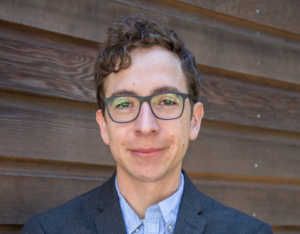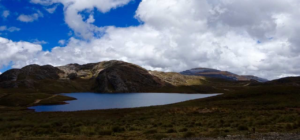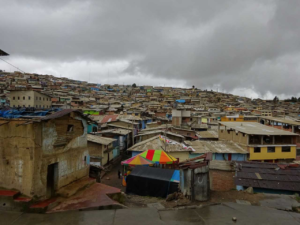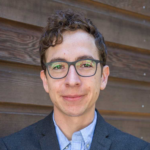Minds of the Movement
An ICNC blog on the people and power of civil resistance
by Michael Wilson BecerrilFebruary 21, 2018
Note: The following Minds of the Movement interview was conducted with activist-scholar Michael Wilson Becerril, a PhD candidate at the University of California, Santa Cruz. Check out his related ICNC webinar on Civilian Strategies in Gold Mining Conflicts in Peru: From Violence to Disciplined Nonviolent Resistance.
Minds of the Movement: What fundamental ideas drive your research?
 Michael Wilson Becerril: I consider my research, teaching, and activism as integral parts of what animates me daily and shapes my choices in each moment: building healing relationships and collective liberation. World peace is a lofty and trite slogan, but the work of building social justice and ecological sustainability requires us to live each day with deep intention, self-criticism, and radical commitments. These aspirations guide my research, but they mean much more than investigating problems and even imagining better worlds through writing and through teaching; they mean going further and enacting them, living and breathing according to them right now. The notion of feeling others’ suffering as my own, and the duty to fight for our freedom and win, cannot be reduced to revolutionary ideas found in a book, a syllabus, or a poster. They are core principles that help me navigate every decision I make from the moment I wake up.
Michael Wilson Becerril: I consider my research, teaching, and activism as integral parts of what animates me daily and shapes my choices in each moment: building healing relationships and collective liberation. World peace is a lofty and trite slogan, but the work of building social justice and ecological sustainability requires us to live each day with deep intention, self-criticism, and radical commitments. These aspirations guide my research, but they mean much more than investigating problems and even imagining better worlds through writing and through teaching; they mean going further and enacting them, living and breathing according to them right now. The notion of feeling others’ suffering as my own, and the duty to fight for our freedom and win, cannot be reduced to revolutionary ideas found in a book, a syllabus, or a poster. They are core principles that help me navigate every decision I make from the moment I wake up.
These ideas also guide how I negotiate the options at each step of my research, from design to drafting and dissemination. For example, they force me to constantly ask myself questions like: Who is this work for? How does research become exploitative and self-serving, and how can it be made to serve social and ecological justice instead? By constantly asking myself these things, I become more conscious of the choices I make, more accountable to myself and society, and better equipped to serve the people who share their time and their stories with me.
Why should others be interested in learning about your research?

Click to enlarge. Barrick Gold's Lagunas Norte mine, one of the largest gold mines in Peru. Source: Author.
Given the scale, intensity, and compounding effects of climate change, it has never been more important to defend the environment. To make matters more urgent, resource conflicts are becoming increasingly deadly in the past couple of decades. This is especially true in Latin America, which the organization Global Witness classifies as the deadliest region for people who organize for environmental justice—people working to stop, for example, World Bank-sponsored dams in Honduras, illegal loggers in Brazil, sea turtle egg poaching in Costa Rica, mega mines in Peru, and so on. This is why people refer to environmental activism nowadays as a “suicide mission,” especially in countries that emerge from colonialism with commodity-dependent economies and weak political institutions.
Of course, we know that violence over natural resources is not limited to these places, and powerful actors can also silence their opponents with impunity in places like the US and EU. Furthermore, because local territorial dynamics are increasingly tied to international commodity chains, conflicts over natural resources transcend traditional ways of conceiving of locality and space. They involve and link people on various ends of commodity chains, from sites of extraction to retail, consumption, and waste. For example, there is gold in almost every electronic device. Ultimately, this is a global and pressing matter—not because of political or ideological reasons, nor even economically, but because unsustainable resource governance threatens the entire biosphere. Resource conflicts involve everyone and impact everything, no matter how distant extractive industries may seem to be.
Studying resource conflicts in depth can help to unlock wider debates, relevant across the globe, about democratization, the role of the market, the viability of dominant models of social and economic organization, and the future of the planet. At the same time, the full complexity of these conflicts cannot be reduced to a ‘good and evil’ story, which would contribute only superficially. Learning the intricacies of these conflicts, in their particular contexts, is much more useful, as it produces actionable knowledge. This is what my work aims to do. It contextualizes the localized dynamics of structural forces, and it highlights the agency of people traditionally undermined by the academic mainstream. Their theorizing and their actions can teach invaluable lessons to people involved in similar struggles.
Who would benefit from learning about your research and how?

Click to enlarge. Despite hosting several mines, including one owned by the most profitable gold producer in the world, the town of Quiruvilca remains economically disadvantaged. Source: Author.
The objective of my work is to be useful. Academics measure their ‘impact scores’ according to citation counts, which do say something about our reach. However, my audience is not necessarily the established academic. My work should first interest people who seek grounded analyses of resistance. Because the heart of my dissertation is resource extraction in Peru, I hope that it will be particularly relevant and useful to people organizing for social change, especially regarding extractive projects, and especially in Peru.
My research compiles and delivers fresh insights about the analytical and practical work of organizers on the ground. Through participatory research, my research documents, describes, and theorizes takeaways from their struggles and efforts at improving their communities. Therefore, the ethnographic stories and their comparative analysis in my dissertation will be useful to people interested in social change inside and well beyond Peru. My intention is for this work to be adapted where useful, criticized, and improved by new generations of organizers and activists.
Folks more broadly interested in violence and conflict will find my findings relevant. Building upon a rich tradition, my work problematizes traditional conceptions of conflict and offers an original approach to understanding what violence is, where it comes from, and what it does in people’s lived experiences. Students of Latin American politics will also appreciate the contextualized analysis of how Peru’s political culture influences the dynamics of gold mining conflicts—namely, because of its legal framework, recent history of internal conflict, concentrated media monopolies, and the public discourses that dominate discussions of mining politics in the country.
Beyond activists and scholars, my work is aimed toward assisting the other stakeholders involved in resource conflicts: policymakers, corporate decision-makers, actors in non-profit and international organizations, and others who may be searching for ways to direct resources, offer support, and help to build durable solutions.
What types of information and sources do you wish you had to conduct your research?
In my experience, researchers can always use a bit more hands-on engagement with the themes they are studying. Although people drawn to Minds of the Movement are among the exceptions to this rule, there is generally an overabundance of patronizing advice from self-identified ‘experts’ who have never gotten their hands dirty in organizing very much at all. Activist communities, on the other hand, are often searching for outputs in which they can narrate their own stories—platforms where their own research can provide bottom-up accounts of what they are doing, and of what they might need (and also what they don’t want) from outside supporters. Activist-research can be a bridge that serves both of these goals mutually.

Michael Wilson Becerril
Michael Wilson Becerril (he/él) is an activist scholar with more than ten years of experience working for social and environmental justice. His written work has appeared in the Journal of Resistance Studies, Feminist Review, Terrorism & Political Violence, Peace Review, Human Rights Review, The Washington Post, Al Jazeera, the Environmental Justice Atlas, and Latino Rebels.
Read More